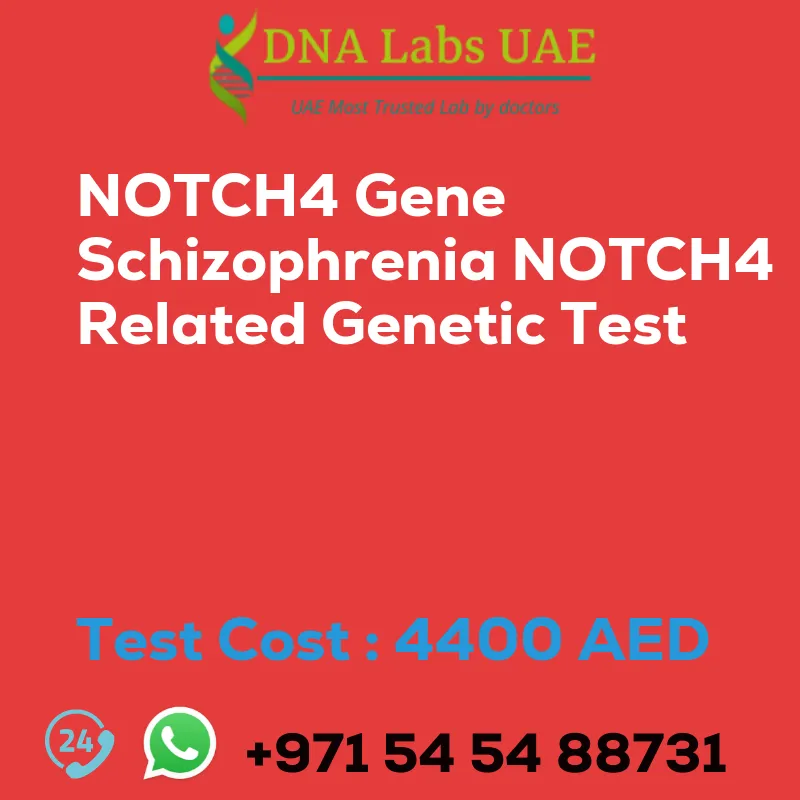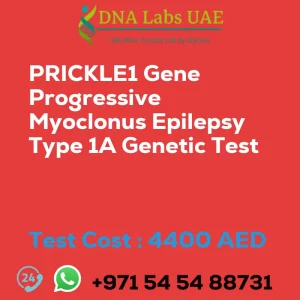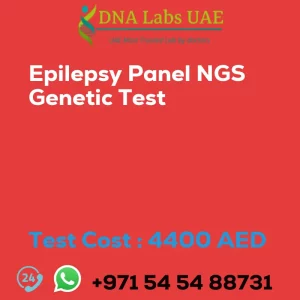Genetic Lab Blog: NOTCH4 Gene Schizophrenia NOTCH4 related Genetic Test cost AED:4400.0 symptoms diagnosis
Test Name: NOTCH4 Gene Schizophrenia NOTCH4 related Genetic Test
Components: Price 4400.0 AED
Sample Condition: Blood or Extracted DNA or One drop Blood on FTA Card
Report Delivery: 3 to 4 Weeks
Method: NGS Technology
Test type: Neurological Disorders
Doctor: Neurologist
Test Department: Genetics
Pre Test Information: Clinical History of Patient who is going for NOTCH4 Gene Schizophrenia, NOTCH4 related NGS Genetic DNA Test. A Genetic Counselling session to draw a pedigree chart of family members affected with NOTCH4 Gene Schizophrenia, NOTCH4 related.
Test Details: The NOTCH4 gene has been implicated in the development of schizophrenia, a complex psychiatric disorder. The NOTCH4 gene codes for a protein that is involved in cell signaling and communication in the brain. A NOTCH4-related next-generation sequencing (NGS) genetic test is a diagnostic tool that can be used to analyze the DNA sequence of the NOTCH4 gene. This test can identify any variations or mutations in the gene that may be associated with an increased risk of developing schizophrenia. NGS technology allows for the simultaneous analysis of multiple genes, making it a powerful tool for genetic testing. By analyzing the entire coding region of the NOTCH4 gene, NGS testing can provide a comprehensive assessment of any potential genetic variations. However, it is important to note that genetic testing for schizophrenia is not commonly performed in clinical practice. Schizophrenia is a complex disorder that is influenced by a combination of genetic, environmental, and developmental factors. While genetic variations in the NOTCH4 gene may contribute to the risk of developing schizophrenia, they are not the sole determinant. Genetic testing for schizophrenia is mainly conducted in research settings to better understand the genetic basis of the disorder. It is not typically used for diagnostic purposes or to guide treatment decisions in clinical practice. The diagnosis of schizophrenia is primarily based on clinical symptoms and a thorough psychiatric evaluation. If you are concerned about your risk of developing schizophrenia or have a family history of the disorder, it is recommended to consult with a healthcare professional or a genetic counselor. They can provide you with more information about genetic testing options and help you understand the implications of the results.
| Test Name | NOTCH4 Gene Schizophrenia NOTCH4 related Genetic Test |
|---|---|
| Components | |
| Price | 4400.0 AED |
| Sample Condition | Blood or Extracted DNA or One drop Blood on FTA Card o |
| Report Delivery | 3 to 4 Weeks |
| Method | NGS Technology |
| Test type | Neurological Disorders |
| Doctor | Neurologist |
| Test Department: | Genetics |
| Pre Test Information | Clinical History of Patient who is going for NOTCH4 Gene Schizophrenia, NOTCH4 related NGS Genetic DNA Test A Genetic Counselling session to draw a pedigree chart of family members affected with NOTCH4 Gene Schizophrenia, NOTCH4 related |
| Test Details |
The NOTCH4 gene has been implicated in the development of schizophrenia, a complex psychiatric disorder. The NOTCH4 gene codes for a protein that is involved in cell signaling and communication in the brain. A NOTCH4-related next-generation sequencing (NGS) genetic test is a diagnostic tool that can be used to analyze the DNA sequence of the NOTCH4 gene. This test can identify any variations or mutations in the gene that may be associated with an increased risk of developing schizophrenia. NGS technology allows for the simultaneous analysis of multiple genes, making it a powerful tool for genetic testing. By analyzing the entire coding region of the NOTCH4 gene, NGS testing can provide a comprehensive assessment of any potential genetic variations. However, it is important to note that genetic testing for schizophrenia is not commonly performed in clinical practice. Schizophrenia is a complex disorder that is influenced by a combination of genetic, environmental, and developmental factors. While genetic variations in the NOTCH4 gene may contribute to the risk of developing schizophrenia, they are not the sole determinant. Genetic testing for schizophrenia is mainly conducted in research settings to better understand the genetic basis of the disorder. It is not typically used for diagnostic purposes or to guide treatment decisions in clinical practice. The diagnosis of schizophrenia is primarily based on clinical symptoms and a thorough psychiatric evaluation. If you are concerned about your risk of developing schizophrenia or have a family history of the disorder, it is recommended to consult with a healthcare professional or a genetic counselor. They can provide you with more information about genetic testing options and help you understand the implications of the results. |








